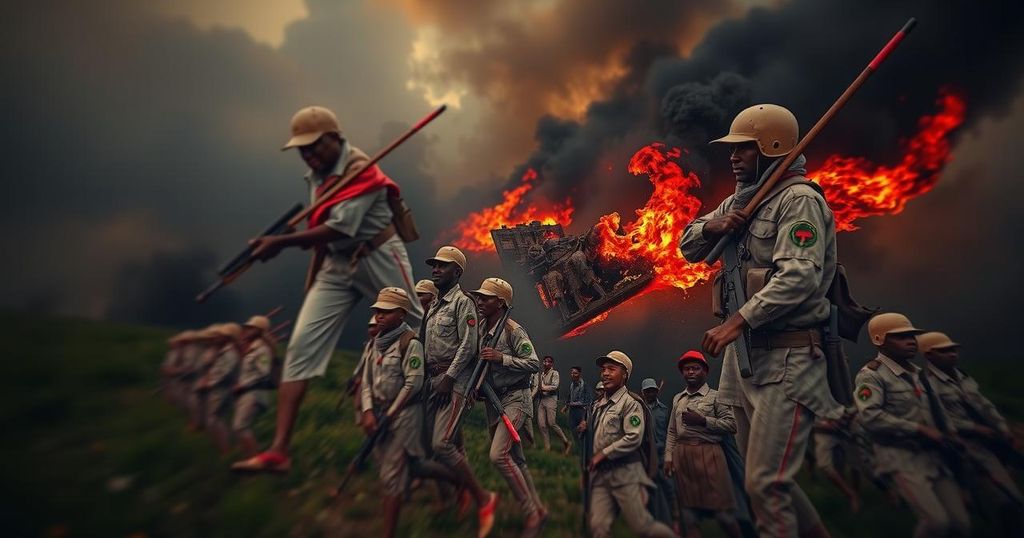The civil war in Sudan has resulted in tens of thousands killed and millions displaced, with a recent U.N. report highlighting widespread sexual violence against women and girls. The RSF and SAF are implicated in these crimes, while the humanitarian situation continues to worsen due to inadequate medical services and limited foreign aid. The plight of the Sudanese people is largely overlooked in favor of global conflicts in other regions.
The ongoing civil war in Sudan, a conflict that has persisted for 18 months, has resulted in the deaths of tens of thousands and the displacement of millions, leading to a humanitarian disaster characterized by severe famine and rampant disease. Amid the catastrophic situation in Sudan, global attention has largely shifted to conflicts in the Middle East, leaving the plight of the Sudanese people overshadowed. A recent 80-page report released by the United Nations Independent International Fact-Finding Mission for Sudan paints a distressing picture, detailing the widespread sexual violence perpetrated against women in the conflict. The report accuses both the Sudanese Armed Forces (SAF) and the Rapid Support Forces (RSF), a former paramilitary faction, of committing egregious acts of sexual violence. Women and girls, as young as eight years old, are reported to be victims of these crimes, with the RSF allegedly responsible for the majority of cases. The findings also indicate that men and boys have not been spared, with credible reports of rape and gang-rape surfacing. The dire circumstances are further exacerbated by a catastrophic lack of medical services, as conflict has devastated the majority of healthcare facilities, leaving victims without access to essential medical care. The Chair of the UN mission, Mohamed Chande Othman, conveyed the alarming extent of sexual violence in Sudan, emphasizing the urgent need for intervention. Human rights organizations have echoed these concerns, indicating that the horrors faced by women have led some to contemplate suicide as an escape from their suffering. The brutal conflict in Sudan erupted in April 2023, following escalating tensions between the SAF and RSF, and recent clashes in east-central Sudan have resulted in over 100 fatalities. Reports indicate that the RSF has engaged in shooting civilians, sexually assaulting women and girls, and looting properties. U.N. Secretary-General António Guterres described the situation in Sudan as a “nightmare of violence,” with nearly 25 million individuals now in need of humanitarian assistance. Despite the scale of this crisis, foreign aid remains alarmingly insufficient, with only about half of the U.N.’s $2.7 billion humanitarian appeal being funded. As Sudan approaches complete collapse, its plight continues to be overshadowed by more prominently reported conflicts in other regions.
The conflict in Sudan is rooted in a power struggle between the Sudanese Armed Forces (SAF) and the Rapid Support Forces (RSF), which escalated into a full-blown civil war in April 2023. This conflict has resulted in one of the worst humanitarian crises globally, with millions displaced and facing severe famine and disease. The structural collapse of healthcare and essential services has not only exacerbated the suffering but has also permitted rampant human rights abuses, particularly against women and girls. The United Nations, along with various human rights groups, continues to sound alarms about these abuses, which include widespread sexual violence, another layer of the crisis that requires urgent attention.
The situation in Sudan demands immediate global attention and intervention. The alarming reports of widespread sexual violence underscore the urgent humanitarian needs of the population, particularly vulnerable groups such as women and children. With only limited foreign aid and a daunting humanitarian crisis exacerbated by violence, the international community must prioritize addressing the disastrous conditions in Sudan while also ensuring that those accountable for atrocities are held responsible. The persistence of these issues amidst a shifting global focus necessitates a recommitment to the principles of human rights and humanitarian support for those suffering in silence.
Original Source: www.foxnews.com






